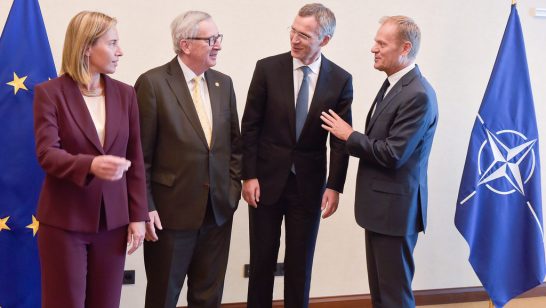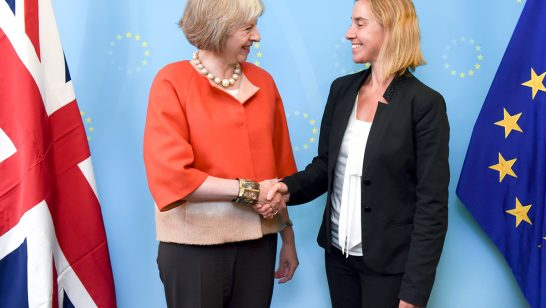
Nicholas Williams was a political adviser to General David Leakey, the first EU Commander of Operation Althea in Bosnia and Herzegovina. He was also a political advisor in SFOR, 1998-2000, the preceding NATO operation.
In his September 2017 State of the Union address to the European Parliament, President of the European Commission Jean-Claude Juncker called for “a credible enlargement perspective for the Western Balkans”. Subsequently, on 6 February 2018, the EU published its detailed Western Balkans Strategy, making it clear that there is a genuine prospect of EU membership for Bosnia and Herzegovina [1], Serbia, Kosovo, Republic of Macedonia, Montenegro and Albania. The EU’s new strategy could see additional member states from the Western Balkans joining from about 2025, depending on the reform efforts of the candidates.
Serbia and Montenegro are already considered to be front-runners, Bosnia and Kosovo the back markers. Bosnia lags behind its neighbours despite the sustained attention it has received from the international community since the signature of the Dayton Peace Accords in December 1995. More than twenty years after the accords were signed, Bosnia still has an international military presence to keep the peace provided by the EU, in the form of EU Force (EUFOR) Operation Althea. Under UN Security Council Resolution 2384 (2017), the EU is authorised by the UN to use force if the safe and secure environment is threatened. This is a significant and longstanding responsibility. But it is an anachronism and an anomaly in a country which essentially has long been at peace and seeks to join the EU. It is time to work towards ending the EU’s military presence Operation Althea.
Bosnia’s hard road to the EU
Bosnia applied for EU membership in February 2016. Nevertheless, with the approach of the October 2018 elections, the original political enthusiasm for EU inspired reforms and the EU perspective has recently cooled down. Pre-election positioning has already triggered increased friction between the entities[2]. The President of Republika Srpska, Milorad Dodik, continues to make secessionist statements. Bosnian Croats threaten to paralyse Government after the election if there is not a change in the Electoral Law, which disfavours them. In 2016, Bosniacs rioted in Sarajevo and Tuzla out of frustration at Government corruption and the economic and political stagnation of the country.
As before previous elections, mutual resentment between the constituent peoples of the country is on the rise; each, probably rightly, blaming the others for frustrating what each considers its legitimate aspirations. The conventional wisdom is that the potential for deterioration in security remains higher in Bosnia than in the rest of the region, except perhaps Kosovo. The security risks may be higher than elsewhere, but they are still very low. Bosnia has been at peace for over twenty years. The conditions for a return to the conflict of 1992-1995 are no longer present: the post-war distribution of the population in Bosnia make a return to all out ethnic conflict virtually inconceivable.
The EU’s Strategic Review
Against this background, in 2017, Operation Althea underwent its first ever Strategic Review conducted by the EU. A key factor in the decision to initiate this review was the application by the Bosnian Government, supported wholeheartedly by all sections of the population, to apply for EU membership.
In the view of some EU member states, a country seeking membership of the EU should not have a UN-mandated EU military mission on its soil as the ultimate guarantor of peace and stability. An EU aspirant should be able to ensure internal order without the help of an outside military presence. In this view, even if the EU’s military function in Bosnia has evolved from a deterrent to a reassurance role, the military presence could at some stage become an obstacle to progress towards EU membership.
The EU’s Strategic Review is continuing. In keeping with the notion that Operation Althea should end, if practicable, sooner rather than later, the Review is likely to result in a retrenchment and a return to basics, focusing on Operation Althea’s main UN mandated task of supporting Bosnia in maintaining a safe and secure environment. Operation Althea’s other non-essential and no longer necessary tasks, such as training and capacity building of the Bosnian armed forces, may be downgraded or left to NATO to pick up. A further Strategic Review is scheduled for 2019 to assess the value of the EU’s military presence in the light of Bosnia’s progress towards EU membership.
The end of Operation Althea in sight?
There are two basic scenarios for Bosnia and Herzegovina. One entails negative continuity – to persevere with the EU’s military presence because it provides psychological comfort against abandonment for sections of the Bosnian population. Furthermore, when the Bosnians see other countries in the region, but especially Serbia, making steady progress towards EU accession, while they stagnate, there will be an increased risk of further popular unrest. In which case, with the fear of instability, there will be voices within the EU, echoed in NATO, to extend the EU’s military presence and mandate in Bosnia. Under this scenario there is no foreseeable end to the EU’s military presence in Bosnia, and therefore no foreseeable prospect of EU membership.
But there is a more positive scenario. If the Bosnian Government responds effectively to EU processes (as it has done, albeit belatedly, to the EU Commission’s initial Opinion Questionnaire, the first step after the application to join), the gravitational pull of EU membership will begin to kick-start the necessary political and economic reforms. Bosnia would not be left behind to stagnate. There is then the prospect of an end to the EU military mission, possibly end 2019 or in 2020. The end of EUFOR Operation Althea would be triggered by the follow-up Strategic Review by the EU in 2019.
The EU should be bold
Bosnia has been calm and stable since the end of the war in 1995. Every election since has been preceded by divisive inter-ethnic and inter-entity rhetoric. The October 2018 elections will be the same. Cautious voices will warn against ceasing Operation Althea because of the spectre of malevolent Russian interference. Others, particularly in the US, will argue against the termination of the international military presence, pointing to regular secessionist sentiments and statements coming from the Republika Srpska. These statements have to be seen in context. They are made in the light of pressure to cede entity power to the state level. Under the flawed Bosnian constitution, Republika Srpska resistance to such pressures is deplorable, but legal. It does not in itself constitute a threat to the safe and secure environment.
It is true that Operation Althea has some residual value. It is psychologically reassuring to elements of the Bosnian population, and it plays a significant role in supervising demining efforts funded by the EU. But this is not enough. Arguments for military continuity should be resisted. There have been the occasional ethnically divisive incidents since the EU took over from NATO in 2004. But given the relative peace in Bosnia since the war of 1992-1995, the significance of these events should not be exaggerated.
Against the voices of caution, the EU should keep its nerve. It should recognise that for Bosnia, the prospect of EU membership is the only show in town, attractive to all sections of the population. Decisive action to end Operation Althea, linked to a genuine prospect of joining the EU, would spur and shock Bosnian politicians towards taking the EU membership process seriously. Only with the incentive of EU membership can the political will be found to agree to reform and strengthen the state, while preserving entity competences. As importantly, tangible Bosnian progress towards EU membership would inspire hopes of progress in the population as a whole for the first time since the 1992-1995 war, irrespective of entity or ethnicity. The EU’s military peacekeeping role in Bosnia is a sign of the country’s abnormality. By agreeing to apply for membership of the EU, the Bosnian Presidency signalled that it wished to move towards a state of normality. The EU should take the opportunity in 2019 at its next Strategic Review to end Operation Althea as soon as practically possible.
[1] For the sake of brevity in the rest of this article, Bosnia and Herzegovina is referred to as Bosnia.
[2] Under the 1995 Peace Agreement, Bosnia and Herzegovina consists of two entities (the mainly Bosniac (Muslim) and Croat populated “Federation of Bosnia and Herzegovina’ and the mainly Serb populated “Republika Srpska”), which exist legally by virtue of the Bosnia and Herzegovina Constitution. In 2016, the Economist Intelligence Unit categorised Bosnia and Herzegovina as “hybrid regime“.
The opinions articulated above also do not necessarily reflect the position of the European Leadership Network or any of its members. The ELN’s aim is to encourage debates that will help develop Europe’s capacity to address pressing foreign, defence, and security challenges.



